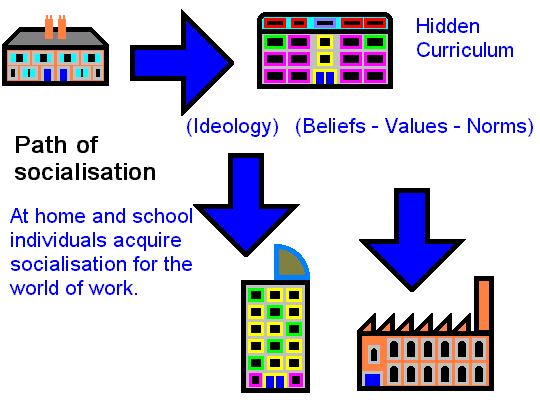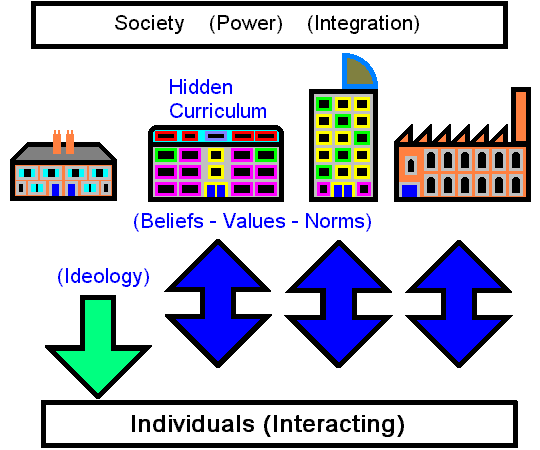
| Aim: | Hidden Curriculum: understanding the place of conflict and consensus perspectives over and above simple description. |
|
To start [asking the class]:
Think about what a Hidden Curriculum in schools might be, starting to think sociologically? A clue - it is connected with learning about socialisation and about the functionalist perspective, and especially learning about ideology in the Marxist perspective. |
| In school we are taught subjects. That's interesting in itself - but we are told much else besides in school. |
What are these extras? They are about socialising us into norms, values and beliefs; or getting us to absorb the ideology of wider capitalist society. Here is a reminder:
|
| Quickly discuss what specific extras are taught in school, and how these expectations relate to training us to behave in the wider world. |
| There is a further challenge about the hidden curriculum: what about within subjects? What hidden curriculum elements relating to norms, values, beliefs and ideology in wider society can be identified in such subjects as RE, English, Economics, Business Studies? |
Here are some examples of all important extras:
|
Learning via subjects (incidentally, knowledge is divided into subjects specialisms because in capitalism we specialise in work - called the division of labour - see again Bowles and Gintis, 1976):
|
| There is a theme here - citizenship, continuity and involvement, knowing about hierarchy and the workings of the economy. It means belonging, functioning and being of more productive use. And in general it means individuals are part of the whole. |
| At this point sociological imagination is needed: to upgrade the sociology and do more with these norms, values, beliefs and ideology. |
|
Describe how norms, values and beliefs developed in people make the functionalist system work.
How does ideology work within a Marxist understanding of ruling class dominated economy and society? |
|
Norms, values and beliefs represent positive integration, binding people and their behaviours into a functionalist system. [Optimistic view]
Ideology represents false consciousness so that you accept ideas of capitalism fundamentally opposed to your true interests as a worker. [Pessimistic, even cynical, view] |
|
Thus we can understand the full impact of the hidden curriculum. Sociological thinking must go to a higher level because sociology analyses, and considers, not just us as individuals in society, but how society comes into us as individuals. Think about this: it is how (functionalist or Marxist) society organises itself so that its parts serve it - how it comes into us. It is about society functioning, or social power being effective (consensus or conflict). Bowles and Gintis (1976) say that education serves the reproduction of labour power for the economy - a correspondence between the relationships in the school and the relationships at the workplace. |
| Visual learners can summarise all this in a diagram or two. Simple diagrams might help you see the whole picture. I suggest using simple designs showing home, school, workplaces, perhaps society as a whole, and individuals, and arrows showing the hidden curriculum socialising people, as directed by the needs of social structure. |

| The above shows progression from home and through the all-important school phase into the worlds of work. |

| Notice how the hidden curriculum is just one part of society arranging and operating its parts. |
|
Remember, to summarise, there is either:
Conflict analysis: a class system that determines an economic structure which pumps out an ideology to cause us to think like it wants - education and the hidden curriculum is part of that ideology. Or: Consensus approach: a functionalist system that looks after its parts, so that each part works to the best for the system: therefore the educational system generates a hidden curriculum of norms, values and beliefs as part of its work towards the whole system. |
There is some criticism of the hidden curriculum correspondence view of Bowles and Gintis (1976)
Paul Willis (1977) analyses unintended consequences of education. Using Marxism and interactionism, he shows how particularly some male pupils resist the values of school by doing as little work as possible and even skipping lessons, creating a counter-culture that became the same lack of respect in the workplace. |
|
Here could be a written essay task:
Describe how "classroom matters" (Hargreaves, 1984) relate to wider society from both functionalist and Marxist perspectives. |
Bowles, S. Gintis, H. (1976), Schooling in Capitalist America, London:Routledge and Kegan Paul.
Gatto, John Taylor (1992), Dumbing Us Down: The Hidden Curriculum of Compulsory Schooling, Philadelphia : New Society Publishers.
Haralambos, M., Holborn. M (2004), Sociology: Themes and Perspectives, sixth edition, London: HarperCollins.
Hargreaves, A., Woods, P. (1984), Classrooms & Staffrooms: The Sociology of Teachers & Teaching, Milton Keynes: Open University Press.
Jackson, P. W. (1968), Life in classrooms, New York, London: Holt, Rinehart & Winston.
Willis, P. (1977), Learning to Labour, Farnborough: Saxon House.